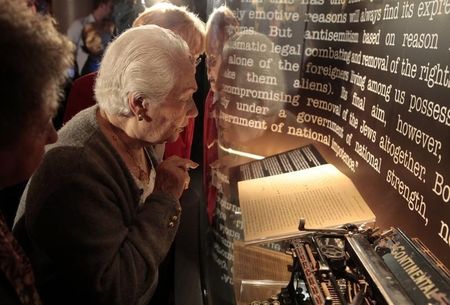By Madeline Chambers
BERLIN (Reuters) - The Simon Wiesenthal Center has sent the German government a list of 80 people it believes murdered Jews while serving in Nazi death squads in World War Two and who may be still alive, the head of the Israel office of the organisation said.
The push for an investigation into members of Einsatzgruppen, or death squads, was triggered by a landmark conviction in 2011 of John Demjanjuk, a guard at the Sobibor death camp, said the Wiesenthal Center's Efraim Zuroff.
Demjanjuk was the first Nazi war criminal to be convicted in Germany for being a guard at a death camp without evidence of a specific crime or victim. He died in March 2012, aged 91.
The verdict unleashed a wave of new investigations even though nearly 70 years after the end of the Holocaust, most suspects have died or are unfit for trial.
The hunt was no longer for high-level perpetrators of the Holocaust, in which some 6 million Jews died, but for thousands of people who helped in the machine of death.
"We want investigations into these people," Zuroff told Reuters.
If a court could convict anyone who served in a death camp, membership of a Nazi body whose main aim was murder could also be grounds for a conviction, he said.
The Einsatzgruppen committed mass killings especially in occupied Poland and the Soviet Union. Including some members of the SS, many historians say the death squads killed more than a million Jews.
The bulk of the crimes would have taken place in 1941-1943, said Zuroff, who has been prevented by Germany's tight privacy laws from finding out whether the 80 individuals on the list, who include four women, are alive or dead. He has picked out members of death squads born after 1920, he said.
"Anyone we find is a victory. The last thing on earth to feel for these people is sympathy," he said.
A spokeswoman for the German justice ministry said the list had been passed to the special prosecutors office in Ludwigsburg that investigates Nazi crimes.

After World War Two a handful of leading death squad members were charged with war crimes.
(Reporting by Madeline Chambers; Editing by Stephen Brown and Sonya Hepinstall)
